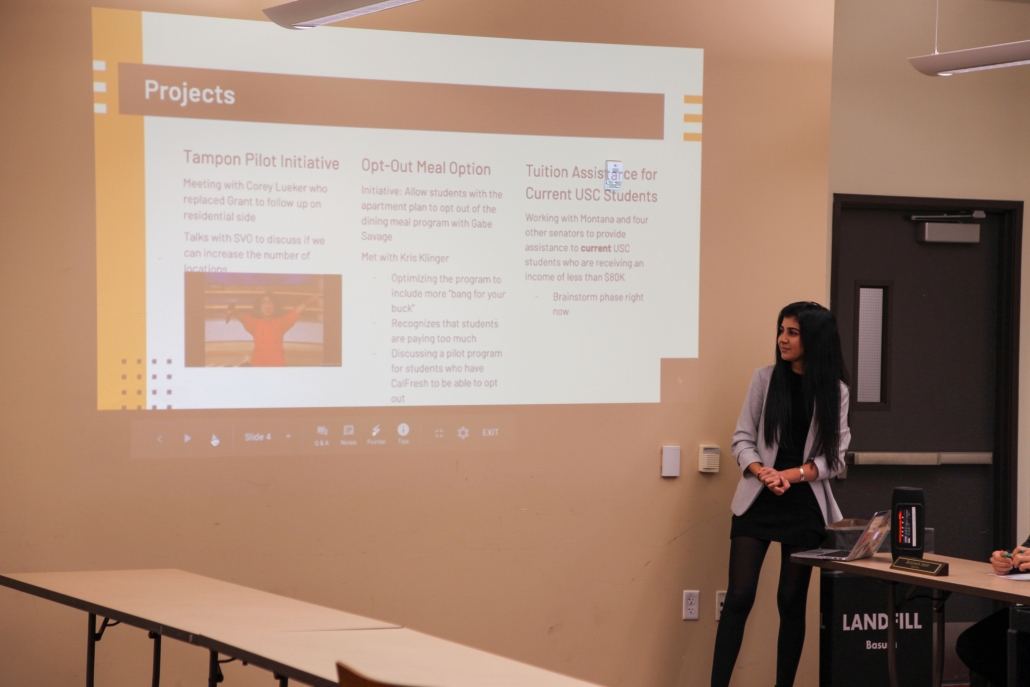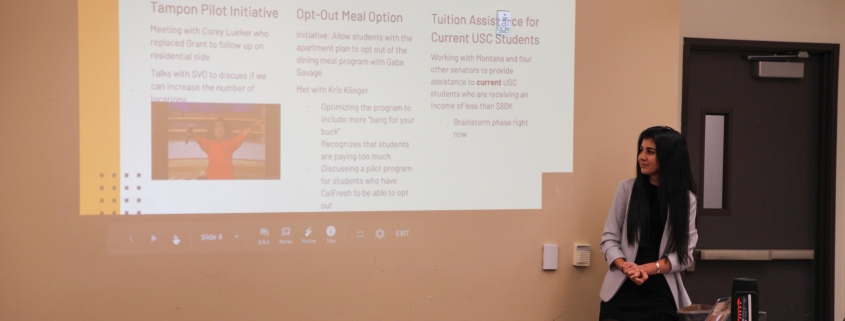USG passes resolution to relocate Title IX Office

The Undergraduate Student Government approved a resolution to relocate the Title IX Office at its meeting Tuesday, citing the inaccessibility of its current temporary location off campus on South Flower Street.
Space Manager Linda Mizushima will work with USG to find a space for the office that would be more accessible for students than the present location. The office’s permanent location, which is in the basement of Stonier Hall and is only accessible by stairs, is currently uninhabited due to a pest problem, according to the resolution.
Members who proposed the resolution said USG should show its support for students with disabilities by specifying that the accessibility problems of the present location should be reason enough to support a move.
“There’s a lot of motivation to get Title IX out of that office,” said Director of Accessibility Affairs Gwen Howard. “Our call is to actively make it because it’s inaccessible and to make sure that the messaging is that we recognize that.”
Sens. Hailey Robertson and Haley Garland, senate aide Katelyn Lee and Howard, who wrote the Title IX resolution, said making the office accessible was especially important because Title IX exists to prevent discrimination against protected classes, including people with disabilities.
“These physical barriers disincentivize students with disabilities from filing reports of discrimination and harassment given the excess physical and emotional labor necessary for them to get equitable treatment,” the resolution stated.
The Senate voted unanimously in favor of the resolution, which will proceed to University administration for discussion and approval.

At the meeting, Sen. Emily Johnson also presented her work to establish a first-generation resource center to consolidate and improve resources for first-generation students. The Senate will send the document to University administrators, including President Carol Folt, Vice President for Student Affairs Winston Crisp and Director of Campus Activities Gabriel Valenzuela.
Sen. Sara Khoshniyati discussed her initiative to implement the use of dining dollars at USC Village businesses, stating that the businesses had not been receptive to the proposal, as it would require them to discount the products they offer.
“They might implement discretionary dollars, but I don’t see them allowing dining dollars in the Village anytime soon,” Khoshniyati said. “It really goes back to businesses and how they are unwilling to grant discounts to students.”
Khoshniyati said she also hoped to expand the number of spaces on campus open to students for studying and social interaction, especially during nonbusiness hours. She said her own experience with limited late-night spaces on campus when she was a freshman helped inspire the initiative, which she hopes will include the reopening of Ground Zero Performance Café.
“Having a social life at USC comes in all different forms,” Khoshniyati said. “We want to give students an outlet to be in an environment they want to be in — one that doesn’t include going off campus.”
During the meeting, Khoshniyati also presented on her work to promote tuition assistance for continuing students from low-income backgrounds. After the University announced a new initiative last month that would grant free tuition to incoming freshmen from households making $80,000 or less per year, several students raised questions about how the new policy would affect current students.
“We need to recognize that Carol Folt has probably already evaluated the situation at hand, and there’s a good reason why she hasn’t done this,” Khoshniyati said. “They could argue … the fact that the University would have to reevaluate every student’s financial need status, but that should not be a barrier to the solution.”
After the Senate updates and resolution proposals, President-Elect Truman Fritz presented his choices for next year’s executive cabinet. He proposed Robertson for chief of staff, discretionary fund co-director Mike Shao for treasurer and marketing director Olivia Frary for senior director of communications. The Senate will vote on the appointments next week.

